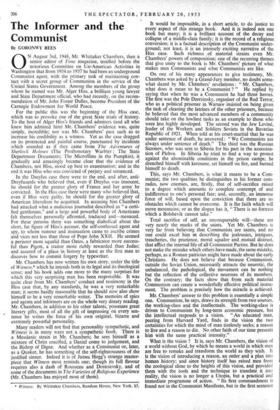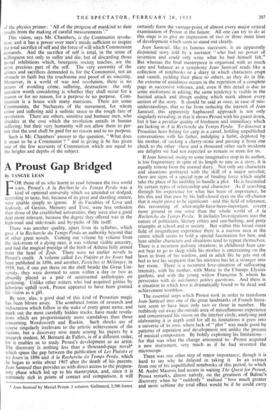The Informer and the Communist
13, GORONWY REES 0 N August 3rd, 1948, Mr. Whittaker Chambers, then a senior editor of Time magazine, testified before the notorious Committee on Un-American Activities in Washington that from 1934 to 1937 he had been an underground Communist agent, with the primary task of maintaining con- tact with a secret group of Communists in the service of the United States Government. Among the members of the group whom he named was Mr. Alger Hiss, a brilliant young lawyer and State Department official, who had recently, on the recom- mendation of Mr. John Foster Dulles, become President of the Carnegie Endowment for World Peace.
For the public this was the beginning of the Hiss case, which was to provoke one of the great State trials of history. To the host of Alger Hiss's friends and admirers (and all who knew him admired him) Mr. Chambers' evidence was, quite simply, incredible; nor was Mr. Chambers' past such as to increase his credibility as a witness. Yet as the case dragged on its protracted and painful course, punctuated by incidents which sounded as if they came from The Adventures of Sherlock Holmes (The Prothonotary Warbler ; The State Department Documents; The Microfilms in the Pumpkin), it gradually and amazingly became clear that the evidence of Chambers, not Hiss, stood up best to examination; and in the end it was Hiss who was convicted of perjury and sentenced.
In the Dreyfus case there were to the end, and after, anti- Dreyfusards who believed that, even if Dreyfus was innocent, he should for the greater glory of France and her army be convicted. In the Hiss case there were many who believed that, even if Hiss were guilty, he should for the greater glory of American liberalism be acquitted. In accusing him Chambers had attacked what a malicious journalist described as "a certi- fied gentleman," and a large and powerful body of Americans felt themselves personally affronted, traduced and—menaced. For these persons there was something diabolical about the short, fat figure of Hiss's accuser, the self-confessed agent and spy, to whom rumour and insinuation came to ascribe crimes and vices not less than those of Pope John XXII. He seemed &perjurer more squalid than Oates, a fabricator more success- ful than Pigott, a traitor more richly rewarded than Judas; and assured of a place in history at least as the first man to discover how to commit forgery by typewriter.
Mr. Chambers has now written his own story, under the title of Witness,* which he intends both in its legal and its theological sense; and his book adds one more to the many surprises for which this very surprising man has been responsible. It was quite clear from Mr. Chambers' conduct and testimony in the Hiss case that, by any standards, he was a very remarkable man; it seems hardly reasonable that he should now also show himself to be a very remarkable writer. The memoirs of spies and agents and informers are on the whole very dreary reading. Mr. Chambers, in addition to his other talents, possesses great literary gifts, most of all the gift of impressing on every sen- tence he writes the force of his own original, bizarre and extremely powerful personality. .
Many readers will not find that personality sympathetic, and Witness is in many ways not a sympathetic book. There is a Messianic strain in Mr. Chambers; he sees himself as a mixture of Christ crucified, a Daniel come to judgement, and the Bishop of Digne. And whether as a Communist or, later, as a Quaker, he has something of the self-righteousness of the justified sinner. Indeed it is of James Hogg's strange master- piece that Witness most reminds one; though its full flavour requires also a dash of Rousseau and Dostoievsky, and of some of the documents in The Varieties of Religious Experience (Mr. Chambers has enjoyed most of them).
* Witness. By Whittaker Chambers, Random House, New York. $S.
It would be impossible, in a short article, to do justice to every aspect of this strange book. And it is indeed not one book but many; it is a brilliant account of the decay and collapse of a middle-class family; it is the record of a religious conversion; it is a factual description of the Communist under- ground; not least, it is an intensely exciting narrative of the Hiss case. Such richness of material strains even Mr. Chambers' powers of composition; one of the recurring themes that give unity to the book is Mr. Chambers' picture of what makes men Communists and what Communists are like.
On one of his many appearances to give testimony, Mr. Chambers was asked by a Grand-Jury member, no doubt some- what dazed by Mr. Chambers' revelations : "Mr. Chambers, what does it mean to be a Communist ? " He replied by saying that when he was a Communist he had three heroes. The first Was the Pole Dzerzinsky, organiser of the Red Terror, who as a political prisoner in Warsaw insisted on being given the task of cleaning the latrines of the other prisoners, because he believed that the most advanced members of a community should take on the lowliest tasks as an example to those who were less highly developed. The second was the Jew Levin, leader of the Workers and Soldiers Soviets in the Bavarian Republic of 1921. When told at his court-martial that he was under sentence of death, he answered : "We Communists are always under sentence of death." The third was the Russian Sazonov, who was sent to Siberia for his part in the assassina- tion of Plehve. In Siberia he tried to find a way to protest against the abominable conditions in the prison camps; he drenched himself with kerosene, set himself on fire, and burned himself to death.
This, says Mr. Chambers, is what it means to be a Com- munist; the two qualities he distinguishes in his former com- rades, now enemies, are, firstly, that of self-sacrifice raised to a degree which amounts to complete contempt of and indifference to one's personal fate; and, secondly, an immense force of will, based upon the conviction that there are no obstacles which cannot be overcome. It is ifhe faith which will move mountains; or as the slogan has it, "There is no fortress which a Bolshevik cannot take."
Total sacrifice of self, an unconquerable will—these are very nearly the marks of the saints. Yet Mr. Chambers is very far from believing that Communists are saints, and no one could excel him -at. describing the jealousies, intrigues, treacheries, the prurience, moral squalor and_mutual distrust, that afflict the internal life of all Communist Parties. But he does not make the mistake which others have made, the same mistake, perhaps, as a Roman patrician might have made about the early Christians. He does not believe that because Communism, outside the Soviet Union, necessarily attracts the neurotic, the unbalanced, the pathological, the -Movement can- be nothing but the reflection of the collective neuroses of its members. On the contrary; the facts show that from such material Communism can create a wonderfully effective political instru- ment. The problem is precisely how the miracle is achieved.
Mr. Chambers' answer to this problem is essentially a simple one. Communism, he says, draws its strength from two sources, the working-class and the intellectuals. The working-class is driven to Communism by long-term economic pressure, but the intellectual responds to a vision. "An educated man, peering from Harvard Yard, finds in the vision the two certainties for which the mind of man tirelessly seeks; a reason to live and a reason to die. No other faith of our time presents him with the same practical intensity." , What is the vision ? It is, says Mr. Chambers, the vision of a world without God, by which he means a world in which men are free to remake and transform the world as they wish. It Is the vision of introducing a reason, an order and a plan into human -history; and since history itself has raised men from the zoological slime to the heights of this vision, and provided them with the tools and the technique to translate it into reality, the vision is no longer a Utopia, but a practical and immediate programme Of action. "Its first commandment is found not in the Communist Manifesto, but in the first sentence of the physics primer: All of the progress of mankind to date results from the making of careful measurements '."
This vision, says Mr. Chambers, is the Communist revolu- tion; and it has a power over men's minds sufficient to inspire the total sacrifice of self and the force of will which Communism demands. And the sacrifice of self is total, in the sense of illingness not only to suffer and die, but of discarding those moral inhibitions which, bourgeois society teaches, are the most precious part of the self. The very enormity of the crimes and sacrifices demanded is, for the Communist, not an obstacle to faith but the touchstone and proof of its sincerity. Moreover, in a world of war and revolution, there is no means of avoiding crime, suffering, destruction : the only question worth considering is whether they shall occur for a reason or for no reason, for a purpose or no purpose. Com- munism is a house with many mansions. There are some Communists, the Nechayers of the movement, for whom crime and suffering add a sadistic sauce to the rough fare of revolution. There are others, sensitive and humane men, who shudder at the cost which the revolution entails in human suffering; but their very, humanity will not allow them to per- mit that the cost shall be paid for no reason and to no purpose.
Such is Mr. Chambers' answer to the question, "What does it mean to be a Communist ? " and in giving it he has given one of the few accounts of Communism which are equal to the heights and depths of the subject.



































 Previous page
Previous page